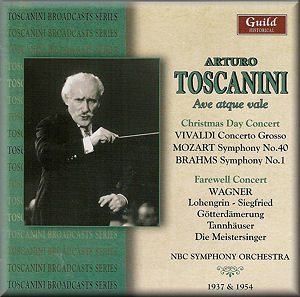 |
 |
|


alternatively
CD: MDT
AmazonUK
AmazonUS
|
Arturo Toscanini - Ave atque vale
CD 1
Antonio VIVALDI (1678-1741)
Concerto Grosso in D minor, Op. 3 No. 11 [12:07]
Wolfgang Amadeus MOZART (1756-1791)
Symphony no. 40 in G minor, K550 [23:04]
Johannes BRAHMS (1833-1897)
Symphony No. 1 in C minor, Op. 68 [42:06]
CD 2
Richard WAGNER (1813-1883)
Lohengrin: Prelude, Act 1 [8:21]
Siegfried: Forest Murmurs [8:46]
Götterdämmerung: Dawn and Siegfried’s Rhine Journey [12:15]
Tannhäuser: Overture and Bacchanale (Paris version) [25:22]
Die Meistersinger von Nürnberg: Prelude, Act 1 [9:24]
 NBC Symphony Orchestra/Arturo Toscanini
NBC Symphony Orchestra/Arturo Toscanini
rec. 25 December 1937, Studio 8H, Radio City, New York (CD 1); 4
April 1954, Carnegie Hall, New York (CD 2)
 GUILD HISTORICAL GHCD 2369/70 [78:03 + 64:08]
GUILD HISTORICAL GHCD 2369/70 [78:03 + 64:08]
|
|
|
This pair of discs presents Toscanini’s first and last concerts
with the NBC Symphony Orchestra, the orchestra created for him.
The first concert was given live on the evening of Christmas
Day, 1937 and is preceded by a short announcement conveying
“Christmas greetings from Radio City.”
Toscanini opened his performing history with the orchestra with
a short work for strings by Vivaldi. In his booklet note Robert
Matthew-Walker justly observes that at this time Vivaldi’s music
was far from as widely performed as is the case today. He also
speculates that the maestro may have chosen the piece to allow
his new string section to play itself in. I’m afraid I find
the music completely devoid of interest but, then, Vivaldi’s
music is a blind spot for me.
I had much higher hopes of the Mozart symphony but was rather
disappointed. Robert Matthew-Walker says that the conductor
“is at one with the composer in his recreative fire and expressive
power. Not that he overdoes the steely strength for which, as
an interpreter, Toscanini would later be criticised in succeeding
NBC Symphony broadcasts …” Respectfully, I have to disagree
with that second sentence. Though there is vigour in the performance
I detect no affection in the interpretation, nor much grace.
On the contrary, in the first movement there are several instances
where chords are played in such a way that they sound almost
brutally chopped – for instance, the chord sequence that comes
at the end of the exposition section. The slow movement is better
but too often the Minuet sounds strict and unyielding, though
the trio fares better. As for the finale, dispatched in a mere
three minutes, the less said about it the better. It
sounds like a case of “let’s show everyone just how fast we
can play this movement.” The music is rushed off its feet and
has no room to breath. Frankly, its perverse. To my ears Toscanini
bullies the symphony. I have no desire to hear again this charmless
account of one of my favourite Mozart works.
The Brahms symphony is much more to my taste. Toscanini certainly
has the measure of this score and leads a fine and often dramatic
account of it. There’s surging energy in the first movement,
while the second movement is taken spaciously and shows the
calibre of the newly-formed orchestra. The finale is powerful
though some may feel, as I do, that some passages in the introduction
are taken too broadly. Once the main allegro is reached, however,
the interpretation is vigorous and dramatic.
Toscanini’s last concert with the orchestra took place in April
1954 when the maestro was starting to fade – I don’t know if
the concert was intended to be his last concert or just became
the finale to his career. The event has passed into legend,
of course, not least on account of the moment during the Meistersinger
Prelude when Toscanini momentarily stopped conducting.
The quality of the music making is high and I don’t think one
would discern, simply from listening, that the conductor’s powers
were waning. He leads a distinguished performance of the timeless
Lohengrin Prelude and distils excellent atmosphere in
‘Forest Murmurs’. The playing of the NBCSO is excellent here
and, indeed, throughout the concert. The Tannhäuser
Overture is noble and the ‘Bacchanale’ is full of energy. The
Meistersinger Prelude is excellent, not least because
the tempi are lively and there’s no hint of bombast. Toscanini’s
very last performance was a fine one.
In considering the sound one must take into consideration the
age of the recordings and the venues. The 1937 sound is rather
shrill at times and there’s little sense of space round the
sound; the timpani boom in the Brahms. Come forward to 1954
and the much more congenial acoustic of Carnegie Hall and one
notices an improvement. However, Guild seem to have transferred
both recordings successfully.
These recordings are not new to CD, I believe – I know the 1954
concert has appeared elsewhere. However, it’s valuable and convenient
for Toscanini devotees to have them in harness.
John Quinn
|
|




 All Nimbus reviews
All Nimbus reviews








